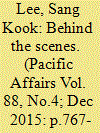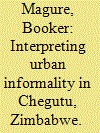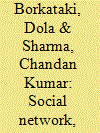|
|
|
Sort Order |
|
|
|
Items / Page
|
|
|
|
|
|
|
| Srl | Item |
| 1 |
ID:
142069


|
|
|
|
|
| Summary/Abstract |
This study shines light on behind-the-scenes informal economic activities in the Thailand-Myanmar borderland, with a focus on unauthorized riverbank Burmese merchants, the cross-border movement of goods, and the nexus of ethnic politics and border trade. issue_image_88_4_ Border Trade by Boat_LeeAlthough unauthorized trade is labeled as “smuggling” by the state, it is withi chiwit, a “way of life,” for Burmese merchants on the riverbank and even recognized by local state agencies. The decision to smuggle is made rationally and deliberately by the merchants as part of their life trajectories, while smuggled goods cater to the needs of local people and are deeply integrated into the economy of the border towns. The cross-border movement of goods by boat also demonstrates that informal ways are still alive and facilitating border trade. It further shows that the ordering of the border is not entirely regulated by state agencies but by other social groups as well, notably ethnic groups.
|
|
|
|
|
|
|
|
|
|
|
|
|
|
|
|
| 2 |
ID:
142517


|
|
|
|
|
| Summary/Abstract |
Using data derived from participant observation and stories told by people in Chegutu, Zimbabwe, this paper argues that urbanites who engage in informal economic activities sometimes defend their right to the city through repertoires of quiet encroachment. To that end, findings from this study demonstrate the connection between the micro (Chegutu) and the macro (across Zimbabwe) in relation to the nature of economic activities people carry out in response to the prevailing poor material conditions. The ability of urban subalterns to secure their livelihoods has been dealt a heavy blow by reckless neoliberal economic restructuring and gross economic mismanagement by the political leadership in Zimbabwe. This article complements the growing body of literature on the urban informality by analysing the various ways people sustain their livelihoods in an economy where market-driven production has replaced national capitalism.
|
|
|
|
|
|
|
|
|
|
|
|
|
|
|
|
| 3 |
ID:
190313


|
|
|
|
|
| Summary/Abstract |
Land alienation among its tribal communities has been one of the most disquieting issues in contemporary India despite existing laws for the protection of tribal land and habitat. This situation is attributed mainly to requisition of tribal land for various developmental activities undertaken by the state as well as its indifference in enforcing the existing laws. The situation in Assam clearly illustrates this. Despite the existing laws, the tribal communities have been unable to retain their ownership of the land. This paper shows that while the state-led development activities are significantly responsible for this, the various informal ways in which the transfer of tribal land takes place at a private level are also no less alarming. Explicating the dynamics behind this process, the paper divulges the multiple informal mechanisms, embedded in community network and trust at the local level to negotiate the protective land laws to facilitate the transfer of tribal land to non-tribal communities.
|
|
|
|
|
|
|
|
|
|
|
|
|
|
|
|
| 4 |
ID:
169135


|
|
|
|
|
| Summary/Abstract |
Rapid population growth in Pacific island cities far exceeds employment opportunities and is contributing to rising urban inequality and social exclusions. Livelihoods in the informal urban sector, such as market vending, provide much needed income, rural–urban connectivity and food security, but remain largely excluded from policy and planning frameworks. Spatial, economic and social exclusions limit vendors’ economic advancement, their influence over decision‐making, and their access to basic services. Local communities close to informal markets fill some of the gaps left by the policy neglect, but investment and strategic management remains inadequate when vendors do not have secure market places and recognised rights to work. This article reports on a study of three informal markets in Honiara, Solomon Islands. These markets lack legal status but make significant contributions to urban development and economic opportunities. Drawing on surveys and focus groups with vendors and urban decision‐makers we explore the impact of informal markets on urban economies, how social and institutional relationships hinder vendors’ economic advancement, and the opportunities to create more inclusive livelihoods that could contribute to equitable cities.
|
|
|
|
|
|
|
|
|
|
|
|
|
|
|
|
|
|
|
|
|